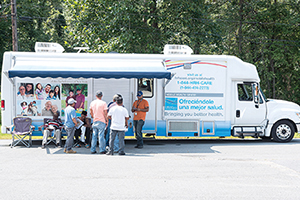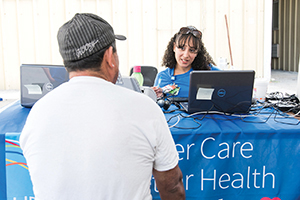By JULIE MINDA
GOSHEN, N.Y. — A $178,000 investment that New York City's ArchCare made in the spring of 2016 holds the promise for short- and long-term health benefits for medically underserved migrant farmworkers in New York's Hudson Valley.

Farmworkers attending a "Day of Health" event at a farm in Ulster County, N.Y., in August wait in line to receive free health screenings from a mobile clinic. ArchCare, the continuing care provider of the Archdiocese of New York, is a principal funder of the clinic.
ArchCare's investment in a mobile health center is a departure from its core role as the continuing care system of the Archdiocese of New York but is in keeping with its mission of providing holistic care to frail and vulnerable people. ArchCare cares for over 9,000 people every day in a variety of settings including five skilled nursing facilities, community and home-based services and a palliative care hospital.
While most of these facilities are in and around New York City, the boundaries of the system's sponsor/owner, the Archdiocese of New York, stretch into upstate New York.
The 33-foot mobile unit is a partnership between ArchCare; HRHCare Community Health, which is a not-for-profit network of 28 federally qualified health centers; the Hearst Foundation; and others. ArchCare, the Hearst Foundation and individual donors provided startup funding to create the mobile unit and to begin operating it. The vehicle cost $253,000 to build. HRHCare staffs and operates the unit.
Mobile unit staff provide primary and preventive care, health education and screenings at farms, community agencies, faith communities and other locations throughout the lower Hudson Valley. ArchCare helps the mobile unit schedulers build relationships with area parishes that host the unit.
A team that includes a family nurse practitioner, a nurse, a patient navigator and driver — all of them bilingual — operates the unit four days a week. Clinical staff attend to the immediate primary care needs of patients. The patient navigator can provide referrals to social services, nutrition counseling, pregnancy care, dental services, mental health services, help for chronic diseases and access to specialty care, as needed.
"The unit is a portal to more care," says Eileen McManus, HRHCare vice president of operations. Staff attempt to find patients a permanent primary care medical home, although that can be challenging because of the general lack of reliable transportation.

An HRHCare representative registers a farmworker for a screening at the Day of Health event.
The mobile unit also participates in some events sponsored by Catholic Charities' immigration legal services program. The programming includes informational sessions on legal aid, "know your rights" training and free legal clinics. At the clinics, Catholic Charities assists with applications for Deferred Action for Childhood Arrivals renewals and for temporary protected status for Hondurans.
The mobile unit saw more than 1,000 patients in calendar year 2017, and nearly 73 percent of those encounters were not billable to a payer, be it Medicaid, Medicare or private insurance. For patients without insurance, the unit charges what McManus says is a minimal amount, determined on a sliding scale based on the person's income. ArchCare and HRHCare cover operating deficits on a 50/50 basis.
ArchCare, HRHCare and Hearst collaborated to bring the mobile health unit to the Hudson Valley because many vulnerable people in the rural farm communities in the area had little or no access to health care services.
The region is known as "black dirt" country because of the nutrient-rich farmland. There are many undocumented migrant laborers toiling at farms as well as in food packing plants.
Sr. Katherine Seibert, SC, a retired doctor, saw patients on the mobile the unit when she was practicing full-time. She says that the farmworkers may be exposed to pesticides that can cause eye infections and other health conditions. Migrants working at a local duck farm labor in cold, wet conditions in the processing area, and there's a danger of lacerations from machines used to process the meat. It is usual for immigrants on both the farms and in the packing plants to work long hours, doing strenuous work. Many fail to seek care if they are injured, because they do not have the money or transportation, or they may not want to miss work, and lose wages, she says.
Commonly, migrant men are in the area without their families. Many eat out of gas stations' convenience food aisles, or they eat unbalanced meals, raising the risk of diabetes, high blood pressure and other chronic conditions, says Sr. Seibert. Living far away from their families, many are lonely. Alcohol abuse is not uncommon, she says.
One Hudson Valley resident without legal immigration status explains that people like her commonly avoid accessing health care services out of fear they'll have to identify themselves and that will lead to deportation. The woman says her family lacks reliable transportation, so she appreciates they can get health care at the mobile unit.
McManus says the unit also is helping HRHCare to improve working conditions for migrants. Mobile clinic staff reinforce through the way they interact with the farm owners and workers that these groups have interconnected interests and share common goals. McManus says the mobile unit "has strengthened the relationship with growers in (Hudson Valley's) Orange and Ulster Counties."
The unit schedules its visits to farms to accommodate the growers' schedules and staffing needs. By acting as a partner with the growers and workers, the unit staff have gained access to the workers to provide health services and education. McManus says at times farm owners will bring sick workers to the mobile unit for care.
Many of the farms in the lower Hudson Valley are locally owned and both growers and workers are exposed to similar environmental threats, such as potentially harmful pesticides on the farms, says McManus. The unit has been partnering with the New York Center for Agricultural Medicine and Health to screen to ensure respirators properly fit wearers and provide protection from pesticide exposure. The unit also has engaged in occupational health projects with the farm owners and farmworkers, including for eye health and back injury protection.
HRHCare and ArchCare are exploring ways to expand the unit's reach, including by adding staff members so that more days can be added to the unit's weekly schedule.
Copyright © 2018 by the Catholic Health Association
of the United States
For reprint permission, contact Betty Crosby or call (314) 253-3490.